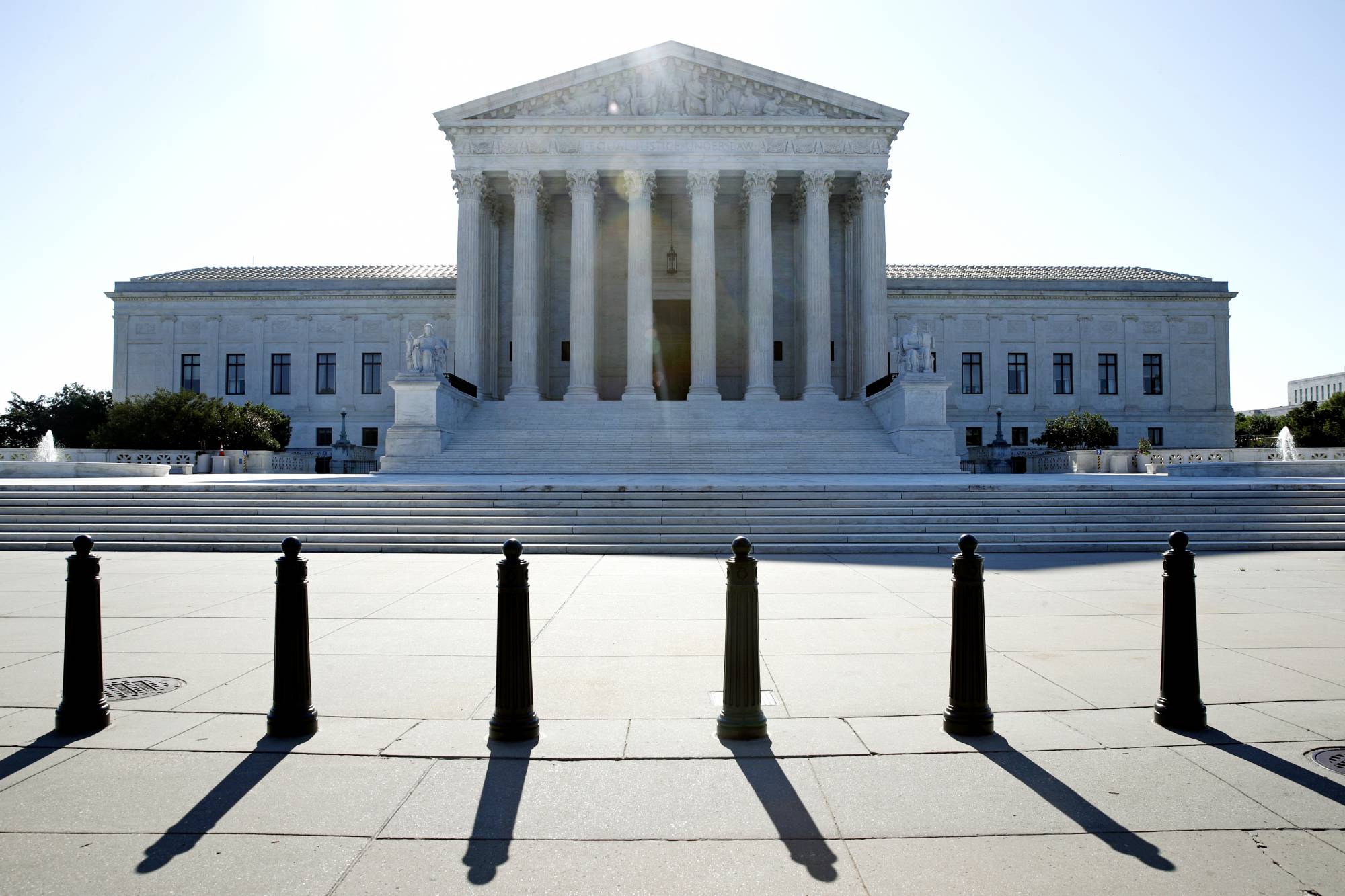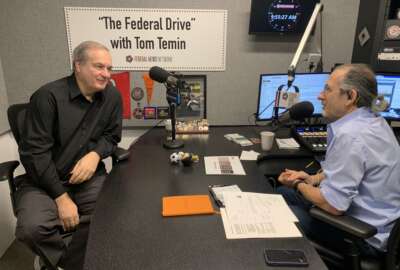Hubbard Radio Washington DC, LLC. All rights reserved. This website is not intended for users located within the European Economic Area.
Supreme Court case that could change 40 years of how government operates
The Supreme Court will soon decide whether to overturn a 40-year-old decision that is come to be known as the Chevron Deference.
The Supreme Court will soon decide whether to overturn a 40-year-old decision that has come to be known as the Chevron Deference. Chevron basically supported administrative latitude of agencies in carrying out laws passed by Congress. The latest case is called Loper Bright Enterprises versus Raimondo. Yes, that is Commerce Secretary Gina Raimondo. For more, the Federal Drive with Tom Temin talks with Texas A & M associate law professor Daniel Walters.
Interview Transcript:
Tom Temin Just give us a brief legal but layman’s understanding of what the Chevron deference was all about and a brief summary of what this latest case against the Commerce Department is all about.
Daniel Walters Sure. So, Chevron is a case decided in 1984 that effectively set up the framework that courts use when reviewing how agencies have interpreted statutes. There’s obviously a lot of case law that goes back before Chevron before 1984. But in Chevron, the court made it very clear how lower courts and the Supreme Court are supposed to review agency interpretations. And essentially, there’s two steps to the analysis. At a first step, the court determines whether the statute is ambiguous. If it’s not, then the courts are supposed to require the agencies to follow the unambiguous language of statutes. If the language is ambiguous, though, the court proceeds to the second step, at which it simply asks whether the agency’s interpretation of ambiguous statutory language is reasonable or not. If it’s reasonable, then the court is supposed to defer to the agency, even if the court might say I prefer a different, reasonable reading of this ambiguous statute. So that’s where deference really kicks in. And that’s why we call it Chevron deference. The courts are supposed to essentially allow agencies to be in the driver’s seat when it comes to interpreting ambiguous statutory language.
Tom Temin So in this latest case, then a company feels that they went beyond reasonable. And that’s the crux.
Daniel Walters That’s correct. Yeah. So, in many, many cases over the years, challenging parties have argued that agencies have misinterpreted statutes. They haven’t earned Chevron deference, whether because they didn’t offer a reasonable interpretation of the statute or at step one, that the statute really isn’t ambiguous. And the courts have sort of dealt with all of these cases, applying Chevron’s framework and determining whether the agency erred. What’s different about this case is the challengers argue that we should toss Chevron out entirely and do something very different, have a different framework for court review of agency interpretation. So, this specific regulation in question had to do with it’s very complicated, but had to do with the Department of Commerce, its ability to require fishermen to pay for the costs of monitors on their fishermen boats, federal monitors, federal monitors. Yeah. So, the Department of Commerce cited some statutory language that it argued supported the action that the department took. But obviously the challengers disagree with that. Now, what’s interesting about the case is it could have been litigated, like all of these other cases over the years within the Chevron framework. But there’s been a lot of momentum building over the years to do something different from Chevron. There’s been a lot of criticisms of Chevron. And so, the challengers in this case really elected to lean into some of those arguments and to say this is the right vehicle to discard Chevron entirely.
Tom Temin It sounds like the growing controversy over the years with Chevron has to do, in some sense, with people’s basic philosophical or political views of how widely government regulation should go. Fair to say?
Daniel Walters Well, I think it’s very interesting, actually. You know, initially Chevron was thought to be sort of a way for more conservative judges to sort of realize their policy preferences. There was a concern that liberal judges, like largely on the D.C. circuit, were using their interpretive authority to constrain the Reagan era agencies that were trying to deregulate. And, of course, Chevron says defer to agency. So, if an agency wants to engage in deregulation, interpreted statutes in very narrow ways, then Chevron allows them to do that just as it allows them to regulate. Right. So initially it kind of had a different political valence that it has now. It’s really only in the last couple of administrations that we’ve really seen a pronounced shift to thinking about Chevron as largely a pro regulatory doctrine. And that is kind of an odd thing when you look at the entire history of the doctrine. But I think it’s fair to say now that it has become coated as sort of a pro regulatory decision and framework because it allows agencies to make a lot of moves in their staff authorizations.
Tom Temin I guess all of these saws have blades on. Both sides. We’re speaking with Daniel Walters, an associate law professor at Texas A&M University. And should the court overturned Chevron. Let’s start with federal agencies that regulate. And that’s most of them. What would the practical effect be, do you think?
Daniel Walters Well, I think in many cases the agencies that won cases under Chevron in prior years are going to have to revisit a lot of those decisions. So, at a minimum, agencies are going to have to go back and say, are all of our rules that we promulgated over the years still on good footing? Do we need to revisit them? Are they likely to survive judicial challenge? So, there will be a lot of searching through the Code of Federal Regulations to see what still stands. I think in addition to that, there will be a lot of adjustment that happens in the lower courts, and that’s probably the biggest implication of changing Chevron. The way I have always understood, Chevron is largely a sort of direction to the lower courts to exercise sort of constrained review. And the Supreme Court, again, going back to the history, early history of Chevron, was worried that lower courts were kind of flexing their muscles too much. So, Chevron was about constraining lower courts. And now what’s going to happen is if we get rid of Chevron, the lower courts are going to be liberated to engage in all kinds of de novo statutory interpretations. That could lead to a lot of circuit splits. So, I think the practical implications of discarding Chevron, if it in fact happens, is the lower courts are going to have to figure out some kind of coordinated approach that doesn’t lead to chaos. That really is a very likely outcome.
Tom Temin It sounds like it could also mean that you would have different states with different flavors of that level of court, having different interpretations of what comes before them.
Daniel Walters That’s quite possible. Whether it’s federal district courts or circuit courts, expect all kinds of inter-regional, interstate disputes about what statutes mean, and even just what rules are in effect at any given time. Because some states may say an agency regulation is invalid and there might be conflicting decisions in other states, other district courts. So, I think it’ll be a while until we figure out what the full implications of overturning Chevron are. But that’s very likely one that we’ll have to sort through.
Tom Temin And you have written to that proponents who say that overturning Chevron would force Congress to write more specific laws so these questions wouldn’t come up like, yes, you can specifically regulate CO2 or no, you can’t if you’re the EPA and so on. Or, you know, is that puddle really a U.S. waterway, this kind of thing? But you’re arguing that it actually may not be the case that Congress would be forced to write more and more specific laws.
Daniel Walters Yeah. So, a sort of common theme across many administrative law domains right now is this kind of theory that if you change administrative law doctrine, you might change Congress’s incentives to promulgate statutes. So, we see this with Chevron. We have also seen it with the non-delegation doctrine. The argument is essentially that we’ve sort of created perverse incentives for Congress with all of these very deferential doctrines and kind of hands-off approach that the courts have adopted. So, in theory, it might make some sense that if you change those doctrines, you might change congressional behavior. And that certainly was you know, what Paul Clement argued in Loper Brite, the case involving overturning Chevron. And it came up in a lot of the briefing as well. Now, there are a lot of reasons to be skeptical of that hypothesis as well. Congress is a very complicated institution. It has a lot of different incentives. Crosscutting incentives and administrative law doctrine is just one of those things that might plausibly affect Congress. So how big of an impact would it be? Could we measure it? Those are the kinds of questions that I wanted to ask as a law professor and a social scientist. So, what I did was I looked at what has happened in the states. State court systems have their own deference doctrines, and they vary quite a bit compared to the federal case. So, we actually have kind of a living laboratory to see what happens when different states adopt different approaches. And it turns out that there’s not a lot of evidence that overturning Chevron and going to what we call de novo review, kind of an independent judicial judgment of what the statute means, that that has any effect on subsequent legislative behavior. So that’s the basic finding of the of the study.
Tom Temin And this case could be decided. The decision could come out as early as today.
Daniel Walters That’s right. Any time between today and sort of the end of June is a possible outcome.
Copyright © 2024 Federal News Network. All rights reserved. This website is not intended for users located within the European Economic Area.
Tom Temin
Tom Temin is host of the Federal Drive and has been providing insight on federal technology and management issues for more than 30 years.
Follow @tteminWFED





